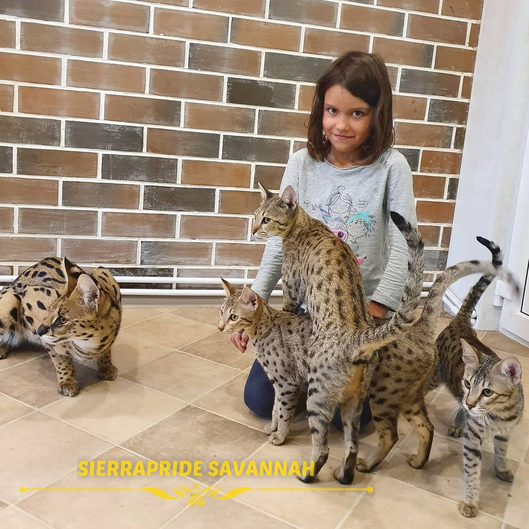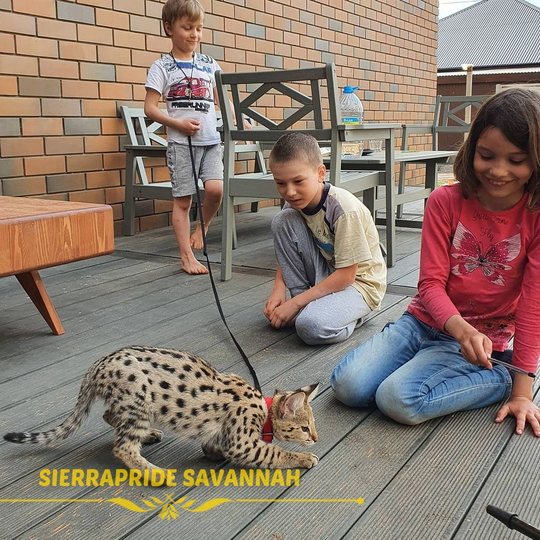Table of Contents

Introduction to Savannah Cats
Savannah cats are a mesmerizing breed that blends the wild allure of the African serval with the domestic charm of a house cat. Their striking spotted coats, long legs, and large ears give them an unmistakable resemblance to their wild ancestors. But beyond their beauty, these cats boast an intelligent and playful nature, making them fascinating companions.
Savannah cats are notable for their large, tall stature, which gives them a majestic presence. They are highly intelligent, curious, and active animals that require engagement and companionship. Their loyalty can be dog-like, often forming strong bonds with their families.
History & Origin of the Savannah Breed
The Savannah cat breed originated in 1986 when a Bengal breeder crossed a male African serval with a domestic cat. The result was an elegant, hybrid feline with a unique temperament. Over the years, selective breeding has led to various generations, each with distinct physical and behavioral traits.
Savannah cats are classified by their filial generation (F1, F2, F3, etc.), which indicates how many generations they are removed from their serval ancestor. F1 Savannahs have a high percentage of wild DNA, making them more exotic and energetic, while later generations (F3 and beyond) exhibit more domestic tendencies.
"The first documented Savannah cat was born in April 1986 when a female domestic cat gave birth to a kitten sired by a male serval. This pioneering hybrid was named "Savannah," which eventually became the name for the entire breed. Breeder Judee Frank was responsible for this initial crossing, though it was Patrick Kelley and Joyce Sroufe who developed a breeding program and worked to establish the Savannah as a recognized breed."
— Judee Frank, Savannah Cat Creator
Recognized by the International Cat Association (TICA) in 2001, Savannahs quickly gained popularity for their exotic looks and dynamic personalities. With each generation, breeders have worked to perfect the balance between wild instincts and domestic sociability, leading to a breed well-adapted to home life yet retaining a glimpse of its wild ancestry.
Distinctive Physical Appearance
One of the most defining features of Savannah cats is their distinctive coat pattern, typically golden with black spots, similar to a cheetah. Their lean, muscular bodies and long legs make them one of the tallest domestic cat breeds. Their large, expressive ears are another signature feature, contributing to their exotic appearance.
An adult Savannah can weigh between 12 to 25 pounds, with males generally being larger than females. Their impressive jumping ability and height make them standout athletes of the cat world.

Facial Features
The Savannah cat head is small in proportion to the body, with the face forming an equilateral triangle. The nose protrudes slightly and the muzzle is tapered with no break. Viewed in profile, the forehead appears straight to slightly convex, and also forms a triangle that extends from the top of the eye to the tip of the nose, then to the jawline and back up to the eye. The neck is long and lean.

Body Structure
Savannah cats have a long, lean appearance, with males typically larger than females. In general, Savannahs bear some resemblance to servals, with later generations expressing more domestic traits.
Understanding Savannah Cat Generations
Savannah cats are classified by filial generation, which indicates how many generations removed they are from their serval ancestor. This classification is crucial for understanding a Savannah's temperament, size, and legal status in various regions.
Savannah Cat Generation Guide
- F1 Generation: Direct offspring of a serval and domestic cat (50-75% serval)
- F2 Generation: Offspring of an F1 Savannah and another Savannah or domestic cat (25-37.5% serval)
- F3 Generation: Offspring of an F2 Savannah (12.5-18.75% serval)
- F4 Generation: Offspring of an F3 Savannah (6.25-9.38% serval)
- F5 Generation and beyond: Considered "SBT" or Stud Book Tradition Savannahs
Early generation Savannahs (F1-F3) typically display more pronounced wild characteristics, including larger size, more distinctive markings, and sometimes more independent personalities. Later generations tend to have more predictable temperaments and smaller size, making them more suitable as family pets for those new to the breed.
Personality & Temperament
Savannah cats are known for their high energy, intelligence, and affectionate nature. They are often compared to dogs in their loyalty and can form deep bonds with their owners. Savannahs are also very social creatures that do well in homes with other pets, especially if raised together from a young age. They can be trained to walk on a leash, play fetch, and even respond to commands.
Savannah are known for being:
-
Loyal: They form strong bonds with their human families
-
Intelligent: Quick learners who enjoy puzzle toys and training
-
Sociable: Generally good with children, other cats, and even cat-friendly dogs
-
Playful: Retain their kitten-like playfulness well into adulthood

Are Savannah Good Family Pets?
Savannah make excellent family companions for several reasons:
Family-Friendly
Gentle and patient with children when properly socialized
Adaptable
Adjust well to various living situations, including apartments
Moderately Vocal
Communicate with soft chirps and meows rather than loud yowling
While they are loving, Savannahs are not lap cats. They thrive on interaction and play and will often seek out adventures around the home. Engaging them with Automated Cat Toys can help satisfy their need for stimulation and activity.
Daily Care Checklist
Expert Tip
Savannah kittens often enjoy water play, unlike many domestic cats. Consider providing shallow water dishes or even small fountains for them to explore. This can be a great way to keep them entertained and hydrated!
Savannah Care Guide
Diet & Nutrition
A Savannah cat's diet should be carefully considered to maintain their health and vitality. High-quality cat food that is rich in protein and low in carbohydrates is ideal, as it mirrors their natural dietary needs. Access to fresh water is crucial, and integrating a Cat Fountain can encourage hydration and support their urinary tract health.
Recommended Diet Options:
A high-protein diet, often including raw or premium wet food, is recommended to meet their nutritional needs. Many owners opt for raw or partially raw diets to mimic their natural feeding patterns.
-
Premium Commercial Cat Food: High-quality dry or wet cat food with real meat as the first ingredient
-
Raw or Fresh Food: Some breeders recommend a balanced raw diet or fresh cat food subscription services
-
Mixed Feeding: A combination of dry food for dental health and wet food for hydration
Always provide fresh water and monitor your Savannah's weight, adjusting portions as needed to maintain ideal body condition.
Consult with your veterinarian to develop a feeding plan tailored to your Savannah's specific needs based on age, weight, and activity level.

Living with a Savannah
Savannah adapt well to various living situations, including apartments and houses. They are social cats that enjoy being part of family activities and generally get along well with children and other pets when properly introduced.
Good with children
Patient and playful with kids of all ages
Good with other pets
Sociable with cats and cat-friendly dogs
Apartment-friendly
Adapts well to smaller living spaces
Low separation anxiety
Can entertain themselves when alone
While Savannahs are not overly demanding, they do appreciate companionship and will often follow their owners around the house. They're not typically "lap cats," but they enjoy being near their people and participating in daily activities.
Is a Savannah Cat Right for You?
While Savannah cats are undeniably beautiful and fascinating companions, they're not the right pet for everyone. Before committing to bringing a Savannah kitten into your home, honestly assess whether your lifestyle, living situation, and expectations align with this unique breed's needs.
Ideal Savannah Owner Traits
- Active lifestyle with time for play
- Experience with high-energy pets
- Secure, spacious living environment
- Financial resources for quality care
- Patience for training and socialization
- Appreciation for an interactive pet
Challenging Situations
- Apartment living with limited space
- Frequent long absences from home
- Desire for a traditional, low-maintenance cat
- Restrictive HOA or rental policies
- Households with very young children
- Budget constraints for specialized care
Featured Savannah Articles

Socializing Your Savannah Kitten with Other Pets
Expert tips for introducing your Savannah kitten to dogs and other cats to ensure harmonious relationships in your multi-pet household.

Building the Perfect Outdoor Enclosure for Your Savannah
Learn how to create a safe, enriching outdoor space that satisfies your Savannah's natural instincts.